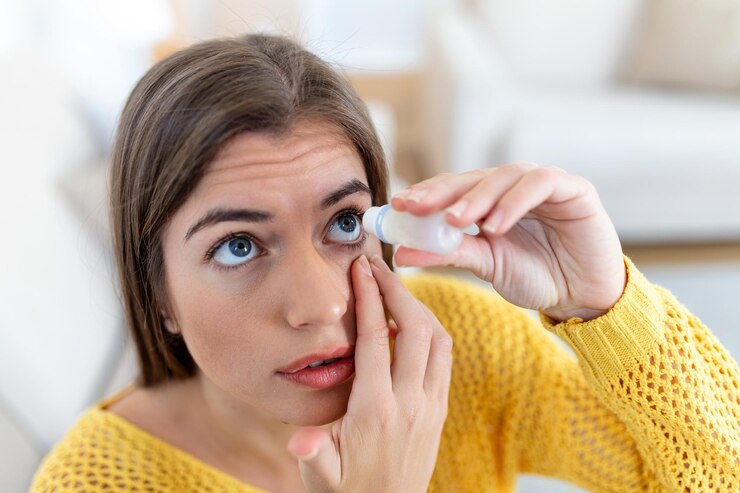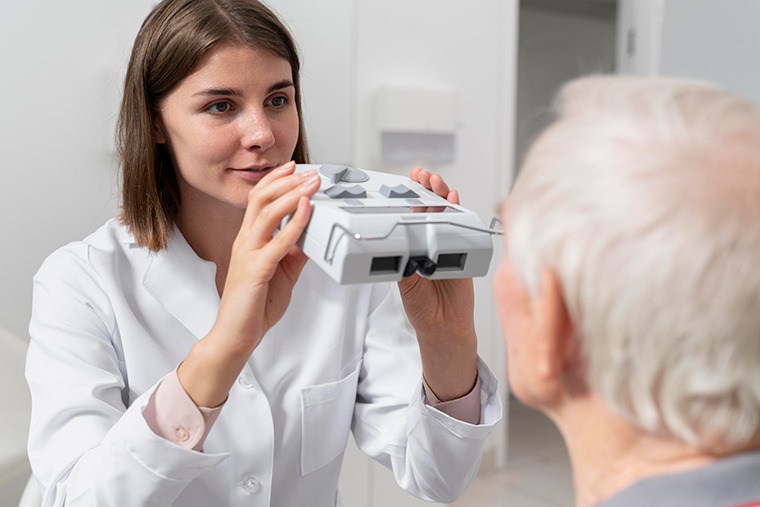The Silent Threat: Untreated Glaucoma and Its Consequences
April 25, 2024
Have Any Questions?
Please contact us, if you have any queries
Categories

Imagine a scenario where a threat silently lurks within, gradually robbing you of your vision without a whisper of warning. This is the ominous reality of untreated glaucoma, a condition that demands attention and timely intervention to prevent irreversible damage.
In this exploration, we unravel the consequences of leaving glaucoma untreated and emphasize the importance of proactive eye care.
Understanding Glaucoma: The Silent Thief of Sight
Glaucoma is not a singular eye condition but a group of disorders characterized by damage to the optic nerve. It often develops when there is an imbalance between the production and drainage of the fluid (aqueous humor) in the eye, leading to increased intraocular pressure. Left untreated, glaucoma progresses slowly, often without any noticeable symptoms in its early stages.
The Consequences of Neglect:
Gradual vision loss:
One of the most insidious aspects of glaucoma is its gradual and irreversible impact on vision. The optic nerve damage compromises the transmission of visual signals to the brain, resulting in a gradual loss of peripheral vision. Over time, this loss can extend to central vision, leading to significant visual impairment.
Tunnel Vision:
Glaucoma often manifests as tunnel vision, where individuals perceive only a narrow central field of view. This narrowing of vision is a hallmark of advanced glaucoma and can severely impact daily activities such as reading, driving, and recognizing faces.
Blindness:
If left untreated, glaucoma can progress to irreversible blindness. The slow and stealthy nature of glaucoma makes it a leading cause of preventable blindness worldwide. Regular eye check-ups are essential for early detection and intervention to halt the progression of the disease.
Impact on Quality of Life:
Glaucoma not only affects the physical act of seeing but also has profound implications for an individual’s overall quality of life. Loss of independence, challenges in performing routine tasks, and potential psychological impact are significant aspects of untreated glaucoma.
The Importance of Timely Intervention:
Early detection saves sight.
Regular eye check-ups are instrumental in detecting glaucoma in its early stages when treatment is most effective. Early intervention can prevent further damage to the optic nerve and preserve vision.
Effective Treatment Options:
Glaucoma management typically involves reducing intraocular pressure through medications, laser therapy, or surgery. These treatments aim to slow down or halt the progression of the disease, allowing individuals to maintain functional vision.
Customized Care:
The approach to glaucoma treatment is often tailored to the individual’s specific condition. Ophthalmic professionals, like those at Dr. Rani Menon Maxivision Eye Hospital, emphasize personalized care to address the unique needs of each patient.
Dr. Rani Menon Maxivision Eye Hospital: A Beacon of Eye Care Excellence
In the realm of eye care, Dr. Rani Menon Maxivision Eye Hospital stands as a beacon of excellence. With a commitment to advanced diagnostics, personalized treatment plans, and a holistic approach to eye health, Dr. Rani Menon ensures that each patient receives the highest standard of care.
Under the guidance of Dr. Rani Menon, is equipped with state-of-the-art facilities to diagnose and manage glaucoma effectively. The hospital’s multidisciplinary team collaborates to provide comprehensive eye care services, emphasizing the importance of early detection and intervention.
Empowering Vision, Preventing Blindness
The consequences of leaving glaucoma untreated are too severe to be ignored. Vision is a precious gift, and proactive eye care is the key to preserving it. Dr. Rani Menon Maxivision Eye Hospital exemplifies a commitment to excellence in eye care, guiding individuals towards a future where preventable blindness is averted through timely intervention.
If you have concerns about glaucoma or wish to prioritize your eye health, schedule a consultation with Dr. Rani Menon Maxivision Eye Hospital. Your vision deserves the best care, and the journey towards optimal eye health begins with a commitment to regular eye check-ups and timely intervention.






 Living with diabetes and vision requires constant vigilance over various aspects of your health. While most individuals are familiar with the impact of diabetes on blood sugar levels and organ function, it’s crucial not to overlook its effects on vision. Diabetes can significantly impact eye health, leading to complications that may result in permanent vision impairment. In this blog, we will explore three ways diabetes can affect your vision and the importance of regular eye check-ups.
Living with diabetes and vision requires constant vigilance over various aspects of your health. While most individuals are familiar with the impact of diabetes on blood sugar levels and organ function, it’s crucial not to overlook its effects on vision. Diabetes can significantly impact eye health, leading to complications that may result in permanent vision impairment. In this blog, we will explore three ways diabetes can affect your vision and the importance of regular eye check-ups.